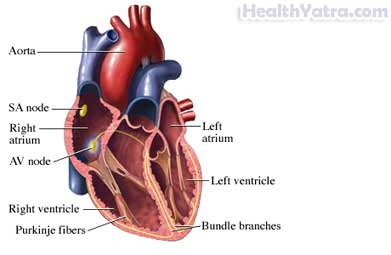تعريف
A heart murmur is an abnormal sound made by turbulent blood flow in the heart. It sounds like whooshing or swishing with each heartbeat. Some adults and many children have incidental heart murmurs that are benign (harmless) and are not caused by abnormalities in the heart. At least 30% of children may have an innocent heart murmur at some point during childhood. However, some heart murmurs can signal an underlying heart problem.

أسباب
Benign murmurs are caused by the normal flow of blood through the heart and large vessels near the heart. The murmur may come and go over time. Some things that can increase blood flow and cause a benign heart murmur to be heard include:
- Exercise
- حمل
- Extreme anxiety
- فقر دم
- حمى
- فرط نشاط الغدة الدرقية
Abnormal heart murmurs can be due to:
- Structural abnormalities of the heart valves (most common)—these may be congenital (present from birth). The structural abnormalities may also be acquired later in life. Examples include:
- Mitral stenosis
- Mitral regurgitation
- Aortic stenosis
- Aortic regurgitation
- Tricuspid stenosis
- Tricuspid regurgitation
- Pulmonary stenosis
- Abnormal holes or connections in the structure of the heart or vessels persisting after birth:
- Septal defects—connection between the heart’s chambers
- Patent ductus-arteriosus—connection between the major artery and vein near the heart
- Structural abnormality of the heart muscle:
- Congenital defects (such as hypertrophic cardiomyopathy)
- Acquired (such as myocardial infarction, heart failure, long-standing high blood pressure)
- Other congenital heart conditions, such as:
- Coarctation of the aorta
- Hypoplastic left heart syndrome
- Ebstein’s anomaly
- رباعية فالو
- Endocarditis—infection of the inner lining of heart valves and chambers (endocardium)
- Cardiac myxoma—a benign soft tumor within the heart (rare)
عوامل الخطر
Risk factors for normal heart murmurs include:
- Age: 3-7 years old
- حمل
Risk factors for abnormal heart murmurs include:
- الحمى الروماتيزمية
- تصلب الشرايين
- ضغط دم مرتفع
- مرض يصيب جهاز المناعه
- Congenital heart defects or disease
الأعراض
Benign heart murmurs usually cause no symptoms. Patients with mitral valve prolapse sometimes complain of vague chest discomfort and other symptoms. It remains unclear whether or not the valvular abnormality is causing the symptoms.
Signs and symptoms of abnormal heart murmurs can include:
- Rapid breathing or trouble breathing
- Blue lips (cyanosis)
- Light-headedness
- ألم في الصدر
- Palpitations (feeling of rapid or irregular heartbeat)
- ممارسة التعصب
- Failure-to-thrive in children
متى يجب أن أتصل بطبيبي؟
If you think that you or your child has a heart murmur, you should see the doctor.
التشخيص
Most benign heart murmurs are diagnosed during the course of a routine physical exam with a stethoscope. Some abnormal heart murmurs are also discovered this way. Other abnormal heart murmurs are discovered initially by their symptoms.
قد تشمل الاختبارات ما يلي:
- Electrocardiogram (ECG)—A test that records the heart’s electrical activity using electrodes attached to the surface of the chest. This does not diagnose the cause of the murmur but can provide other useful information about the condition of the heart.
- Chest x-ray—An x-ray to determine the approximate size and shape of the heart, and the presence of associated lung swelling (pulmonary edema).
- Echocardiogram—A test that uses high-frequency sound waves (ultrasound) to examine the size, shape, and motion of the heart.
- Cardiac catheterization—A tube inserted into the heart through an artery (usually in the groin) to detect problems with the heart’s structure, function, and blood supply.
- Blood tests—To check for evidence of a recurrent heart attack or other diseases that may affect the heart (such as kidney disease, infections, autoimmune conditions).
العلاج
Benign heart murmurs require no treatment. Treatment of other heart murmurs depends on the underlying cause and extent of the problem.
تشمل العلاجات ما يلي:
الدواء
Medicines can either treat the cause of the heart abnormality associated with the murmur or help compensate for its dysfunction:
- Diuretics, angiotensin-converting enzyme inhibitors, digitalis—to treat heart failure
- Antibiotics—to prevent or treat endocarditis
جراحة
Surgery is often necessary to treat severe heart abnormalities:
- Replacement of defective heart valves with artificial ones
- Correction of congenital heart defects
- Removal of heart tumors
الوقاية
Preventing benign heart murmurs is unnecessary. To help reduce your risk of developing an abnormal heart murmur:
- Get prompt testing and treatment for strep throat to prevent rheumatic fever.
- Reduce your risk of atherosclerosis to help prevent valvular heart disease in the distant future. To do this:
- Eat a healthy diet with plenty of fruits and vegetables.
- Get regular exercise.
- إذا كنت تدخن، الإقلاع عن التدخين.
- If you have high blood pressure or diabetes, follow your treatment plan.
Although not routinely recommended for every type of heart murmur, you may need to take antibiotics before and after some medical or dental procedures that could allow bacteria to enter your bloodstream. Ask your doctor if you need to take preventive antibiotics.
